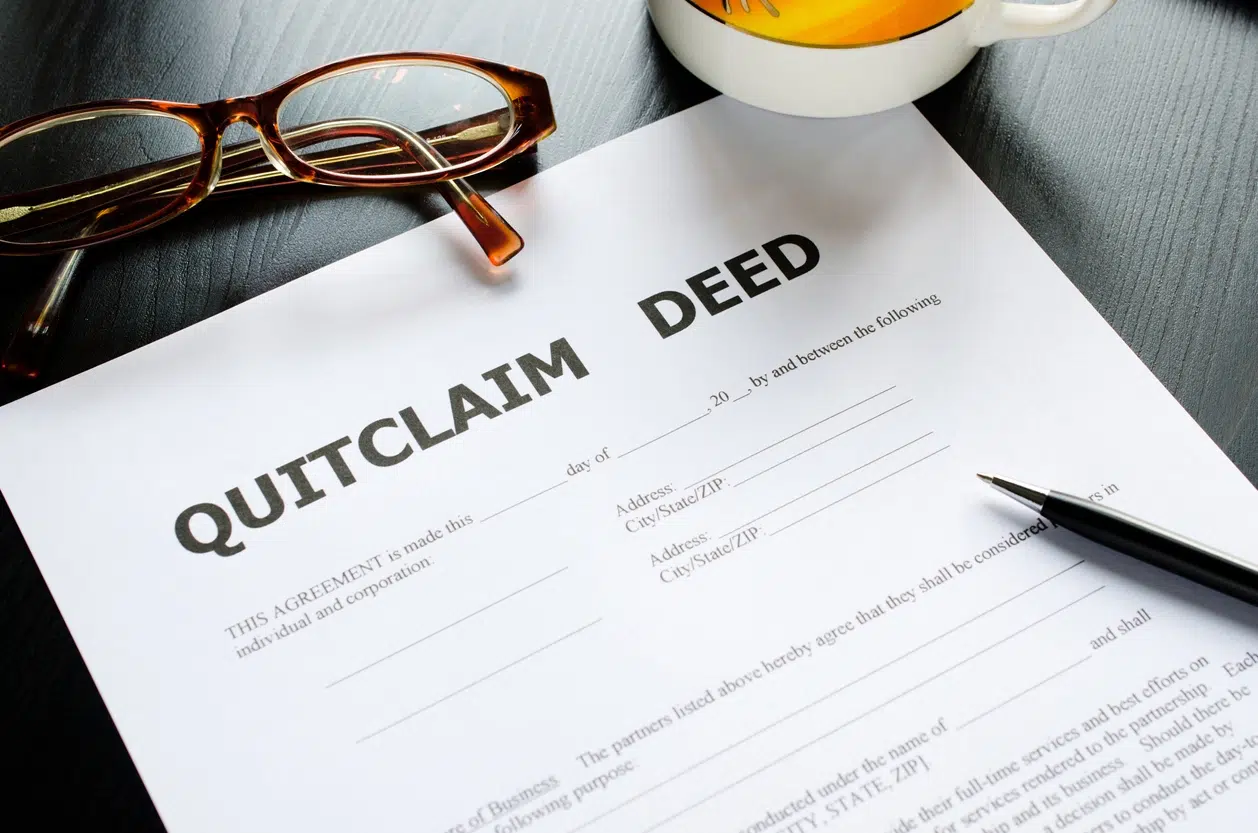Navigating the world of real estate can be complex, and property deeds are a critical aspect often overlooked. A quitclaim deed, a legal document typically used in specific circumstances, transfers ownership interest from one party (the grantor) to another (the grantee) without any warranties of title. It’s essential to understand its function, risks, advantages, and alternatives in real estate transactions.
What is a Quitclaim Deed?
A quitclaim deed, occasionally incorrectly referred to as a “quick claim deed,” is a legal document used to transfer property rights from the grantor to the grantee without any guarantee about the property title’s clarity. The grantor effectively “quits” any claim to the property in question, hence the term “quitclaim deed.” Unlike a general warranty deed or special warranty deed, a quitclaim deed makes no warranties or covenants regarding the absence of liens or encumbrances. Both types of deeds will contain a legal description of the property, who the grantor and grantee is, along with other state customized information. Some states may have quit claim deed forms available online.
In the eyes of real estate law, a quitclaim deed essentially says the grantor is transferring any ownership rights they may have to the grantee. It is often used among family members or in other relationships where trust already exists, such as removing an ex-spouse’s name from a property title after a divorce or moving real property into a living trust for estate planning.
When and Why to Use a Quitclaim Deed
Quitclaim deeds are useful for clear-cut, non-commercial transactions. They provide a simple way for property owners to transfer property to family members, add or remove a spouse’s name after marriage or divorce, or move assets to a living trust. The simplicity of a quitclaim deed form allows for an uncomplicated transfer of property rights. One such use case is to transfer property into a living revocable trust used to avoid probate.
Moreover, quitclaim deeds can be useful in clearing up a chain of title, such as if a previous owner or heir unexpectedly appears, or to clear any remaining interest an ex-spouse may have in a property.
Advantages and Risks of a Quitclaim Deed
The one advantage of a quitclaim deed is its simplicity. A grantor can fill out a quitclaim deed form, have it notarized by a notary public, and then file it with the county clerk to complete the process. It’s a speedy and straightforward method.
However, quitclaim deeds are not without risks. The grantee receives no warranties of title, meaning the new owner assumes all risk for any liens, easements, or encumbrances on the property. Lenders typically don’t accept quitclaim deeds as a sole method of transferring ownership rights because of these risks. Moreover, they can create chain of title issues and do not clear up any clouds on the title potentially making the title uninsurable.
Moreover, it’s important to note that a quitclaim deed does not impact any obligations of the grantor. If an ex-spouse uses a quitclaim deed to transfer property rights to their former partner, for example, they could still be on the hook for the mortgage unless the lender agrees to release them from this obligation.
Alternatives to a Quitclaim Deed
There are several alternatives to quitclaim deeds, including warranty deeds and special warranty deeds. A general warranty deed, often used in real estate transactions, provides the most protection to the grantee. The grantor of this type of deed guarantees that they have clear title to the property, it is free of liens, and they have the right to sell it.
A special warranty deed, on the other hand, only guarantees against issues or encumbrances that arose during the grantor’s ownership of the property. These alternatives can offer greater protection for the grantee and are typically used when the property is sold outside of familial relationships.
Conclusion
Understanding the function and implications of quitclaim deeds can be critical for homeownership, estate planning, and navigating real estate law. Despite their simplicity, it’s important to be aware of their limitations, risks, and alternatives, such as warranty deeds. For nuanced issues involving property deeds, deed transfers, or real estate transactions, it’s always recommended to seek legal advice from a real estate lawyer or title company. These professionals can provide a thorough title search, discuss title insurance options, and guide you through the process of transferring property in accordance with your local laws.
While quitclaim deeds are a simple tool for transferring ownership interest, they may not always be the best choice for every situation. As with any legal document affecting ownership rights, understanding and carefully considering your options can protect you from unexpected legal and financial complications.
To ensure your quitclaim deeds and property transfers align with your unique needs, especially in the realm of estate planning, give us a call. Our law firm is equipped to customize legal solutions tailored to your specific scenarios, ensuring not just seamless transactions but also peace of mind. Don’t navigate the complexities of real estate law solo; let Copper State Planning be your trusted guide and partner.








